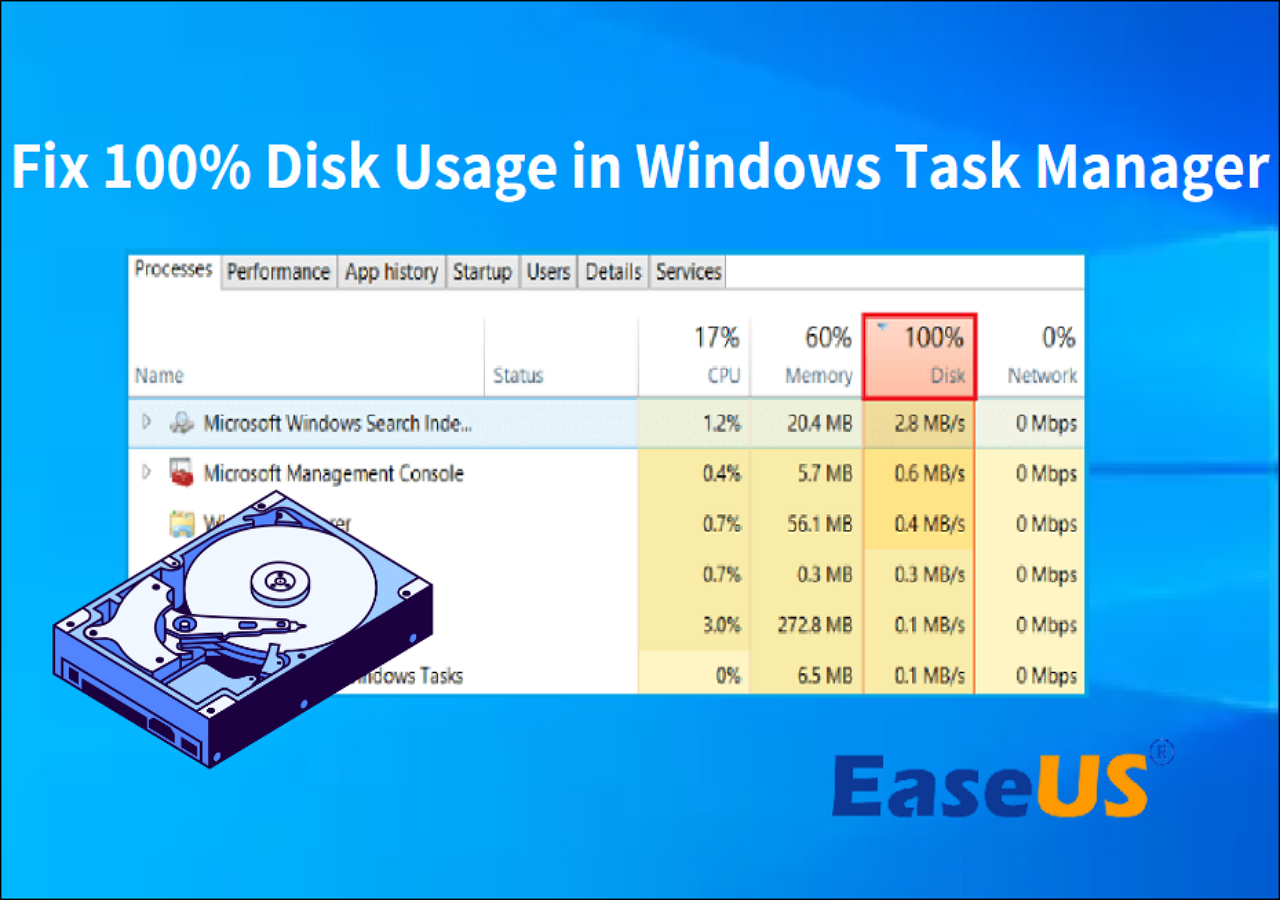Page Table of Contents
About the Author
Hot Topics
Updated on Mar 29, 2025
When you install Windows in the GPT drive, Windows automatically creates four types of partitions. EFI, thus, is among the first partitions. EFI, or Extensible Firmware Interface, stores primary hard drive data. So, it is essential for Windows to function correctly. If you want to format it, your Windows becomes unbootable. However, there are some scenarios when you require to format EFI partition on your Windows 10/11. Keep reading our post and learn in detail.
In this article, you'll learn:
- What is EFI Partition?
- What Is the EFI Partition Used for?
- What Happens If I Format EFI Partition?
- When Can I Format EFI Partition?
- How Do I Format EFI Partition in Windows 11/10?
Before digging deep, let's briefly learn what EFI Partition is.
What is EFI Partition?

If you want to Install Windows 11 in the GPT drive, Windows create an EFI partition along with three others. The EFI store the complex drive data or SSD data for the smooth functions of the window. The size of an EFI partition is approx 100MB file. Users cannot usually view the EFI partition via File Explorer on Windows. Your system OS won't enable any modification button to modify the partition to protect Windows' functions. But if you accidentally delete the EFI, the Windows system become unbootable. However, Windows never allows you to delete it or format it to run the system smoothly.
To get more details about EFI partition, you follow this guide for help: Do I Need EFI System Partition.
What Is the EFI Partition Used for?
EFI partition contains the primary folders, including Boot and System Volume Information. These files contain all the vital information your Windows requires, such as System Utilities, Device Drivers, Data Files, Boot Loaders, etc.
When Windows loading on your system, it uses Boot Manager Code and Boot manager database and extract the information. So, for Windows, it's essential to keep the EFI partition without altering or modifying it.
Another use of EFI is if you try to reinstall or reset your PC, the OEM also uses EFI partition to know the crucial data like drivers, utilities, etc., and use the script available to refresh your PC.
So, if you want to boot your PC, you need an EFI partition; without it, your Windows cannot perform the booting. As it's a protective shield for your Windows, deleting or formatting may be risky because you lose functionality, and Windows cannot perform booting.
What Happens If I Format EFI Partition?
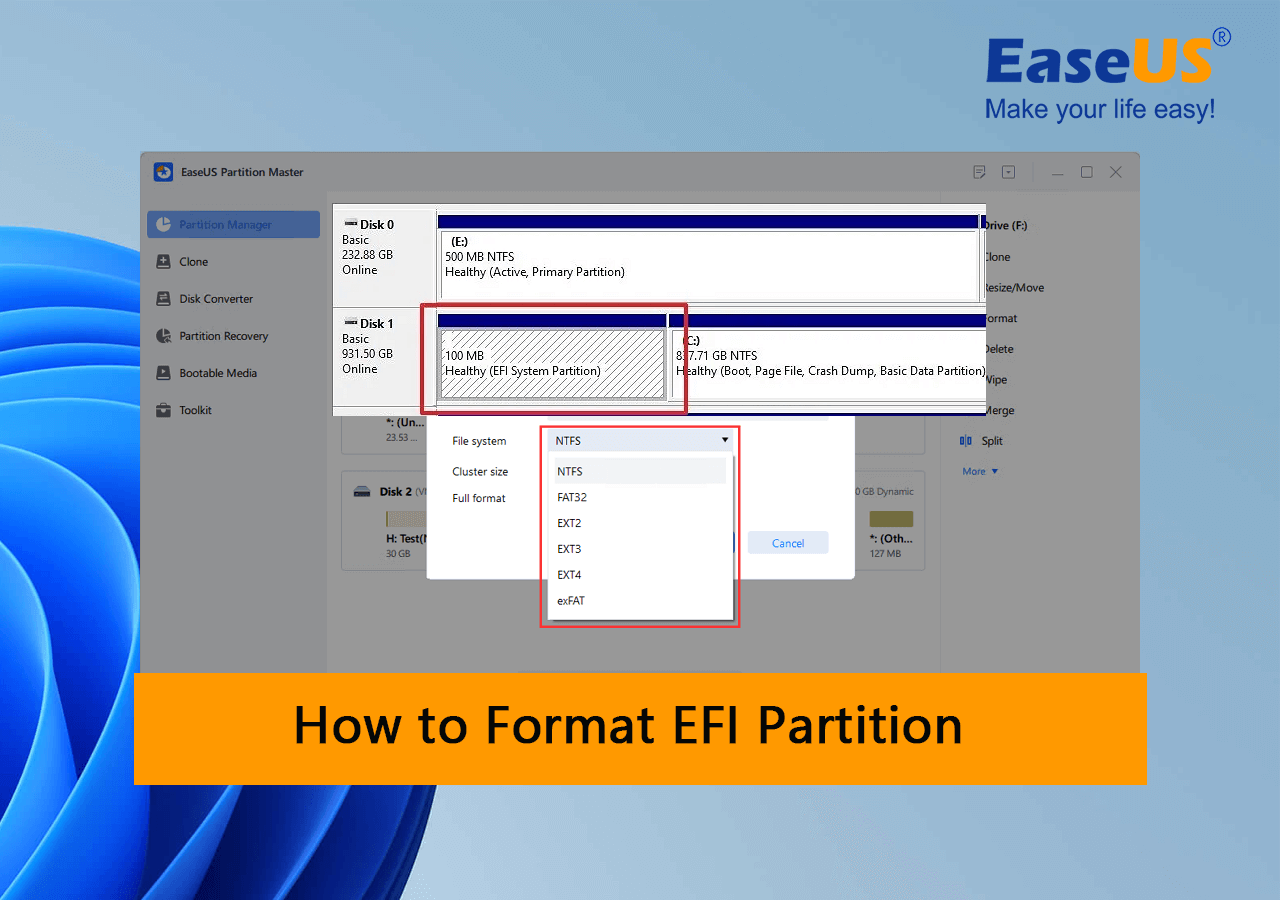
As the EFI partition protects Window's necessary data, it will never allow you to format. However, if mistakenly or accidentally you delete the EFI Partition, you may face several consequences that include:
- Your Windows become unbootable
- Your system gets a boot failure error
- You cannot use system functionalities
- Your system will take longer time to Power on than usual time
- After formatting the EFI, your system becomes unprotected and unlocked
When Can I Format EFI Partition?
Suppose you want to reinstall your latest Windows version and get an error message on your screen that Windows found the EFI partition was formatted as NTFS. In that case, Windows will command you to format the EFI partition as FAT32 and restart the installation process. In this scenario, Windows, for its own functionality, ask you to format an EFI partition, which doesn't affect the boot functionalities, and you can format the EFI partition and allow Windows to finish the reinstallation process.
You can format your EFI Partition if the EFI becomes RAW on Windows. Due to its internal errors, sometimes the EFI partition becomes RAW and corrupted. To fix this issue, you need to format it.
You must fix these errors by formatting the EFI Partition and allowing Windows to function as usual.
How Do I Format EFI Partition in Windows 11/10?
Under some unpleasant scenario, you must format EFI partition to save your Windows functions and run the system without losing data. For example, if the EFI partition becomes NTFS, you must format it and change it into FAT32.
If you face a similar issue during the reinstallation of Windows, you can follow the guide.
Guide 1: Format EFI Partition Using EaseUS Partition Master
If you're using Windows 10/11, you can use third-party software like EaseUS Partition Master Professional to perform the formatting. EaseUS Partition Master is a reliable tool that ensures no data loss during the formatting process. Further, the tool will allow you to back up the ESP file beforehand.
When you detect that the EFI partition has become NTFS, install the software on your PC and start the process. Within three simple clicks, you can have the EFI partition in FAT32. The partition Master software is compatible with all the latest and older version of Windows.
Step 1. Run EaseUS Partition Master, right-click the hard drive partition you intend to format and choose "Format".
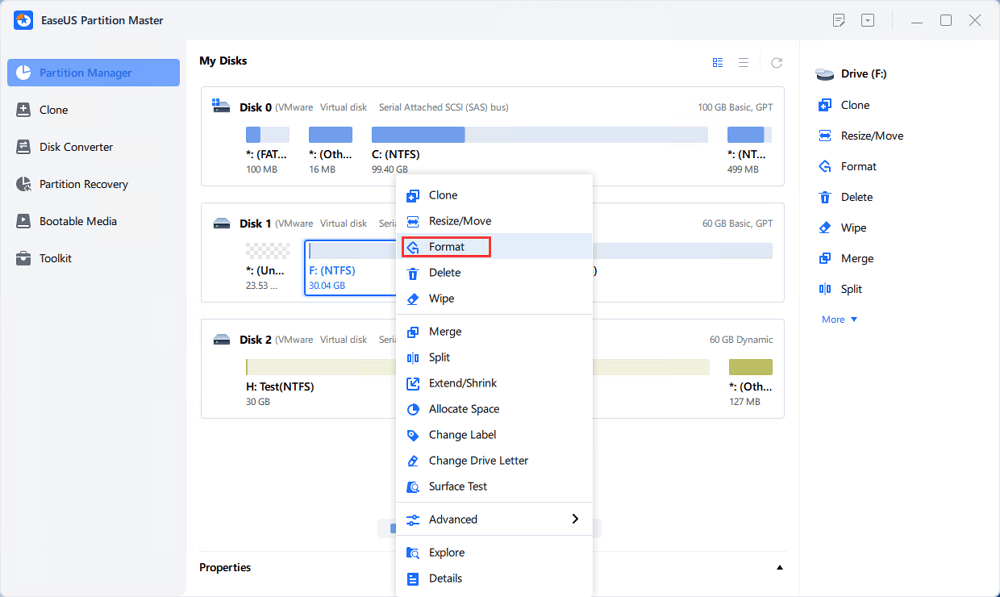
Step 2. In the new window, set the Partition label, File system (NTFS/FAT32/EXT2/EXT3/EXT4/exFAT), and Cluster size for the partition to be formatted, then click "OK".
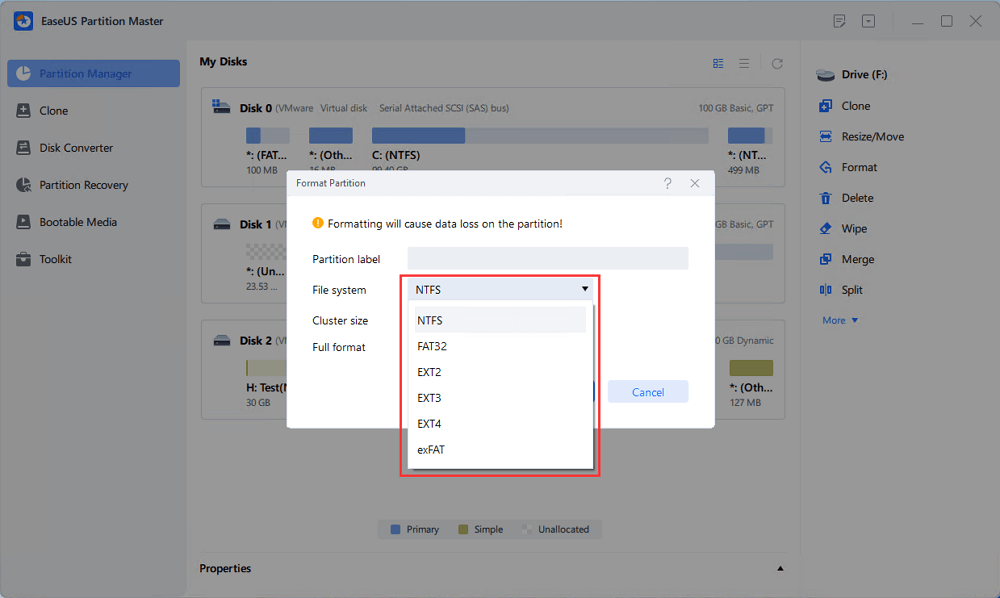
Step 3. Then you will see a warning window, click "Yes" in it to continue.
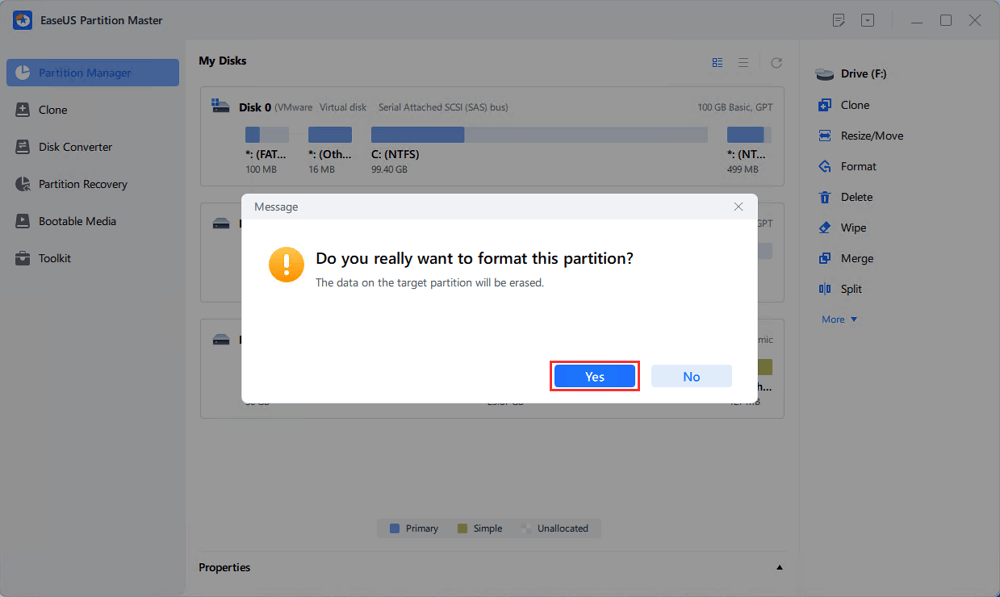
Step 4. Click the "Execute 1 Task(s)" button to review the changes, then click "Apply" to start formatting the partition on your hard drive.
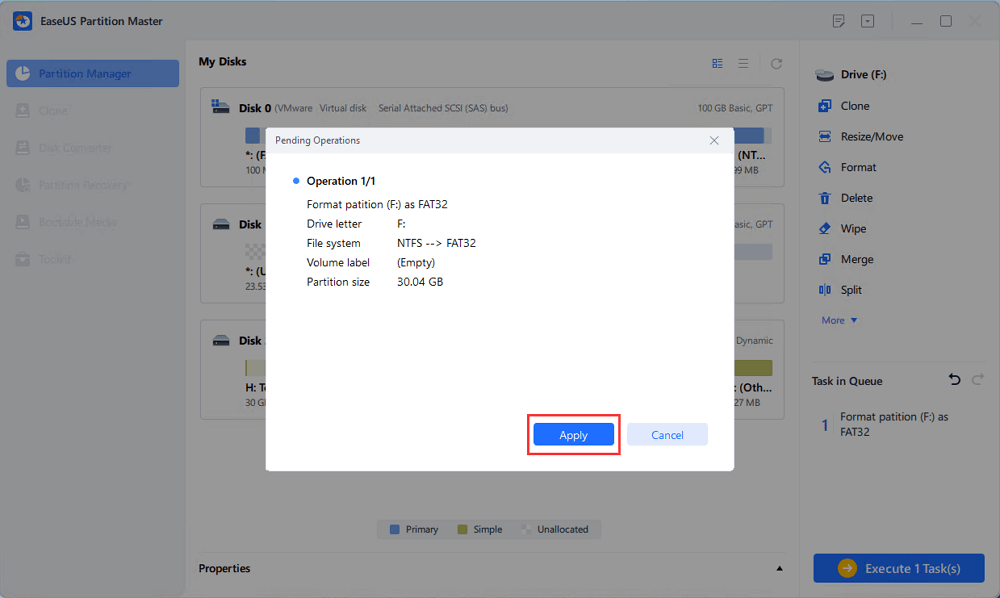
Aside from formatting EFI partition, EaseUS Partition Master also allows to to execute more operations on the partition, including:
The tool is a powerhouse that can deal with any partition issue and provide 100% satisfactory results. In addition, you can resize or move partitions, extend system partition, and create, delete , or merge partitions. Install it on your pc and sort out all your partition issues within a few clicks.
Guide 2: Format EFI Partition Using Diskpart
Diskpart is the other way to fix the EFI partition NTFS issue quickly. As it's a command-line utility, it's a relatively complex method to follow. So, before starting it, ensure you know how to do it. If you don't know, learn here:
Step 1: Run the Diskpart in the Command prompt Window
Step 2: Enter the list disk and press the Enter button.
Step 3: Check your drive and enter the number. If it's disk 2, enter select disk 2 (replace 2 with the disk number of the EFI partition disk)
Step 4: Once you select the disk, enter the below commands:
- list volume
- select volume 2 (replace 2 with the efi partition number)
- format fs=fat32 quick
Step 5: Tap on 'Exit', then hit the Enter button and close the window.
Conclusion
EFI Partition is necessary to function your Windows system smoothly. However, some situations create internally that you need to format EFI Partition. In a usual scenario, you'll not get the option to delete EFI Partition, but if Windows prompts you to do so during the reinstallation of Windows, you need to perform the task. EaseUS Partition Master is a reliable tool you can rely on and install on your PC to solve all your partition-related issues within a few clicks.
How Can We Help You
About the Author
Sherly joined EaseUS in 2022 and she has always loved writing articles and enjoys the fun they bring. She receives professional training here, focusing on product performance and other relative knowledge. She has written over 200 articles to help people overcome computing issues.
Written by Tracy King
Tracy became a member of the EaseUS content team in 2013. Being a technical writer for over 10 years, she is enthusiastic about sharing tips to assist readers in resolving complex issues in disk management, file transfer, PC & Mac performance optimization, etc., like an expert.
Product Reviews
-
I love that the changes you make with EaseUS Partition Master Free aren't immediately applied to the disks. It makes it way easier to play out what will happen after you've made all the changes. I also think the overall look and feel of EaseUS Partition Master Free makes whatever you're doing with your computer's partitions easy.
Read More -
Partition Master Free can Resize, Move, Merge, Migrate, and Copy disks or partitions; convert to local, change label, defragment, check and explore partition; and much more. A premium upgrade adds free tech support and the ability to resize dynamic volumes.
Read More -
It won't hot image your drives or align them, but since it's coupled with a partition manager, it allows you do perform many tasks at once, instead of just cloning drives. You can move partitions around, resize them, defragment, and more, along with the other tools you'd expect from a cloning tool.
Read More
Related Articles
-
Solved: 6 Fixes for Samsung 990 Pro Slow Write Speed - 2025 New
![author icon]() Sherly/2025/03/28
Sherly/2025/03/28 -
How to Fix Windows 11 Startup Repair Not Working | 7 Tips
![author icon]() Cici/2025/04/01
Cici/2025/04/01 -
How to Remove BitLocker Encryption on PC 2025
![author icon]() Tracy King/2025/03/28
Tracy King/2025/03/28 -
How to Build A Laptop For Yourself | Build Your Own Laptop Kit
![author icon]() Tracy King/2025/01/23
Tracy King/2025/01/23
Hot Topics in 2024
EaseUS Partition Master

Manage partitions and optimize disks efficiently

